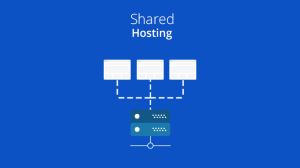Introduction
Building a blog or a website for your business, portfolio, or online store means that you need to learn the basics of web hosting and domain names. These are the two primary cornerstones for bringing your website into existence. This guide will help you understand what web hosting and domain names are, what their differences are, how they relate to each other, and how to determine the most suitable services for your specific website project.


What is a Domain Name?
A domain name is the unique address people type into a browser to visit your website. For example, in the URL www.rextertech.com, “rextertech.com” is the domain name.
Without domain names, users would have to remember long IP addresses like 192.168.1.1. That’s like trying to remember phone numbers for every contact. Domain names simplify it.
Key Points:
A domain name is unique.
It’s registered through a domain registrar.
Domains have extensions like
.com,.org,.in, etc.
How Does a Domain Name Work?
When someone enters your domain name in a browser:
The request goes to a Domain Name System (DNS) server.
DNS converts the domain into an IP address.
The server where your website is hosted is found.
Your site loads in the visitor’s browser.
In short, the domain acts as a bridge between the user and your web hosting server.
Tips for Choosing a Domain Extension
Choose
.comif available.Use country-specific domains for local businesses.
Avoid complicated or less-known TLDs unless necessary.
What is Web Hosting?
Web hosting is a service that stores your website files (HTML, images, videos, scripts) on a server. When someone visits your domain, the host delivers the stored content.
Why You Need Web Hosting:
It keeps your website online 24/7.
It ensures your data is secure and accessible.
It supports features like emails, databases, and CMS platforms.
How Does Web Hosting Work?
Web hosting companies own powerful servers. When you purchase hosting:
You’re renting server space.
You upload your website files to this space.
Hosting software manages the traffic and load.
A control panel (like cPanel or DirectAdmin) allows you to manage your hosting settings, emails, subdomains, and more.
Types of Web Hosting
Different types of hosting options are available depending on the size, traffic, and goal of a website.
1. Shared Hosting
- Another type of hosting is where many websites share a server.
- Good for small blogs and new websites.
- Fairly inexpensive but offers limited resources.
2. VPS Hosting (Virtual Private Server)
- You are given a portion of a server just for you.
- More control and better performance.
- Good for medium-level businesses.
3. Dedicated Hosting
- You are given an entire server to yourself.
- Best for large, high-traffic websites.
- Very expensive and requires knowledge.
4. Cloud Hosting
- A website hosted across multiple servers.
- Very high uptime and scalability.
- Good for businesses that are on the rise.
5. Managed WordPress Hosting
- Optimised hosting for WordPress.
- It has automatic updates, backups, and security.
- Best for the non-tech person focused on actual content.
How to Buy a Domain and Hosting?
Step 1: Find a Reliable Provider
When selecting a provider, it is best to choose one that offers both domains and hosting. It makes the management easier under one dashboard.
Examples:
- RexterTech Hosting Services (Internal Link Suggestion)
- Hostinger
- Bluehost
Step 2: Find and Register Your Domain
You can find any domain name using a search tool. If the first choice you choose for your domain isn’t available, try out different extensions.
Step 3: Choose a Hosting Plan
Because the initial period is ideal for shared hosting, you could upgrade to a more advanced plan once your traffic grows.
Step 4: Connect the Domain to Their Hosting
If bought separately, update DNS settings from your domain registrar to point to your hosting provider.
Tips for Choosing the Right Domain
Keep it short and easy to spell.
Use keywords if possible (e.g., “rajkotwebdesign.com”).
Avoid hyphens and numbers.
Choose a
.comor.infor local business.Use domain tools to check availability and alternatives.
Final Thoughts
Understanding the difference between web hosting and domain names is crucial for building a website. Your domain gives your site a unique identity, while web hosting powers it behind the scenes.
By picking the right domain name and hosting provider, you set the foundation for a strong online presence—whether you’re starting a blog, eCommerce store, or portfolio.



